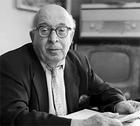
Arnold Zweig was born in 1887 in Gross-Glogau (Silesia). He studied Germanistics, modern letters, philosophy and psychology. Between 1915 and 1918 he was a soldier in Verdun and Serbia. From 1919 he began to reside in Starnberg (Bavaria) as a freelance writer and later in Berlin. In 1933 he left Germany and stayed until 1948 in Palestine; as a Jew, that was not his political homeland.
When he returned to Germany, he stayed in the Democratic Republic (GDR) and was appointed president of the German Academy of Arts and PEN.
Zweig's novels reached millions of copies. However, the texts that did not match the political concept of the GDR on Judaism and psychoanalysis remained unpublished. Zweig died in 1968 in Berlin.
In 1927 his anti-war novel appeared The dispute for Sergeant Grischa, which made him world famous. For decades, Zweig dealt with the issue of the outbreak of violence in the early twentieth century. While in western Germany it was basically ignored, in the GDR it was considered an official classic.





